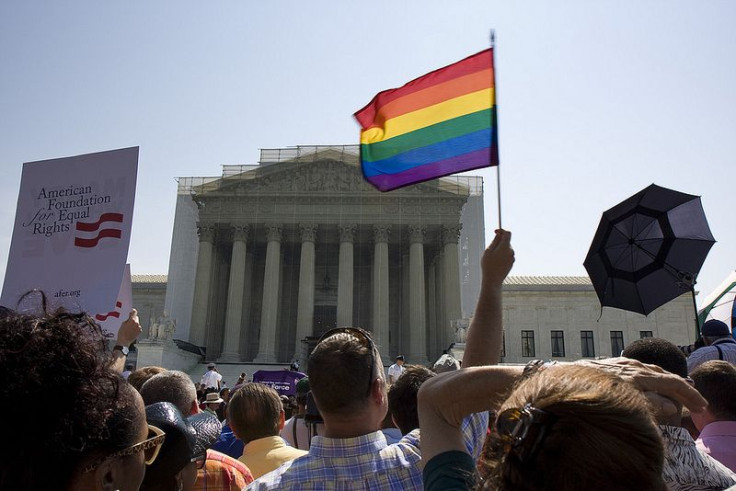Supreme Court Repeals DOMA: Ruling Could Mean Big Changes In Same-Sex Couples’ Access To Health Care

It has been a triumphant day for gay marriage supporters, with the U.S. Supreme Court striking down the Defense of Marriage Act (DOMA) and California's Proposition 8 (Prop 8) in two split decisions that could potentially grant same-sex couples and their families unprecedented access to federal health benefits.
The Rulings
The justices ruled in a 5-4 vote that proponents of heterosexual marriage in California did not have standing to defend Proposition 8 in federal court. "We have never before upheld the standing of a private party to defend the constitutionality of a state statute when state officials have chosen not to," Chief Justice John Roberts wrote. "We decline to do so for the first time here."
The Court's decision on Proposition 8 did not say whether Proposition 8 violates the constitutional guarantee of equal protection. What it did do was uphold a previous ruling of a lower court in which Judge Vaughn Walker wrote, "Plaintiffs do not seek recognition of a new right. To characterize plaintiffs' objective as 'the right to same-sex marriage' would suggest that plaintiffs seek something different from what opposite-sex couples across the state enjoy — namely, marriage. Rather, plaintiffs ask California to recognize their relationships for what they are: marriages."
In another 5-4 decision, the Supreme Court ruled Wednesday that DOMA, which barred the federal government from recognizing same-sex marriages that were legal according to some states, is unconstitutional. The ruling will allow federal benefits, including health care coverage, to be given to couples in 12 states and Washington D.C. who currently recognize same sex marriage. The hope among gay marriage supporters is that DOMA's repeal will also send a message to the 38 states that do not recognize same-sex marriage, that marriage is a right that homosexual couples deserve to enjoy as much as heterosexual couples do.
"The federal statute is invalid, for no legitimate purpose overcomes the purpose and effect to disparage and to injure those whom the State, by its marriage laws, sought to protect in personhood and dignity," Justice Anthony Kennedy wrote. "By seeking to displace this protection and treating those persons as living in marriages less respected than others, the federal statute is in violation of the Fifth Amendment."
While the Court's ruling on Proposition 8 is limited to the borders of the state of California, the justice's decision on DOMA is much more far-reaching.
DOMA and Healthcare
The Supreme Court's ruling on DOMA ensured that the states, not the federal government, would be able to decide whether or not they recognize gay marriage. And, if they do so choose, those same-sex couples who receive recognition from the state in which they were married will also receive that same recognition by the federal government.
DOMA's "demonstrated purpose [was] to ensure that if any State decides to recognize same-sex marriages, those unions will be treated as second-class marriages for purposes of federal law," the majority ruled. The law "diminishes the stability and predictability of basic personal relations the State has found it proper to acknowledge and protect," Kennedy added.
Essentially, the Court's ruling has the potential to afford same-sex couples and their families federal income tax breaks and health care options that were previously reserved for heterosexual couples. Under DOMA, states were allowed to legally exclude homosexual couples from programs like Medicare, Medicaid, and the Consolidated Omnibus Budget Reconciliation Act (COBRA). Now, they will not.
According to Politico, DOMA denying gay couples marital status under federal law led to same-sex couples paying much more for health care coverage than opposite-sex couples. A 2007 study by the Center for American Progress and the Williams Institute found that same-sex couples paid an average of $1,069 more taxes each year than heterosexual couples because heterosexual married couples' employer-sponsored health plan was not treated as income.
After today's ruling, same-sex couples will be placed on equal footing with their heterosexual counterparts when it comes to health care reimbursements and federal income taxes.
DOMA's Impact on the Children of Same-Sex Couples
In the majority opinion, Justice Kennedy wrote, "[DOMA] humiliates tens of thousands of children now being raised by same sex couples. The law in question makes it even more difficult for the children to understand the integrity and closeness of their own family and its concord with other families in their community and in their daily lives."
The American Academy of Pediatrics (AAP) expressed its support for the Court's decision, echoing those same sentiments.
"Today, the U.S. Supreme Court issued two historic decisions affirming the right of same-gender couples to marry," wrote Dr. Thomas K. Mcinerny, president of AAP. "The American Academy of Pediatrics has advocated that civil marriage for same-gender couples is the best way to guarantee benefits and security for their children. If a child has two loving and capable parents who choose to create a permanent bond, it's in the best interest of their children that legal institutions allow them to do so."
Tommy Starling and Jeff Littlefield were married in California before the passage of Proposition 8. The couple expressed their delight with the opinion and how the Court's ruling will impact not only them, but their children.
"Today's ruling means the federal government will no longer be allowed to treat some American families differently," Starling told ABCNews.com. "Now all same-sex couples who are married or who have the freedom to marry will be able to provide their children the necessary legal and economic protections they need in life."
Among those protections is access to both employer-provided and federal health care.
"We can now tell our kids that it's OK that their daddies are married," said Starling. "I think it will help stabilize our family, as well."



























